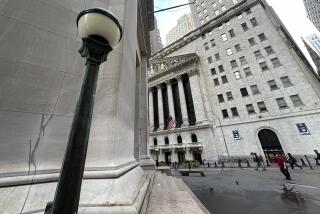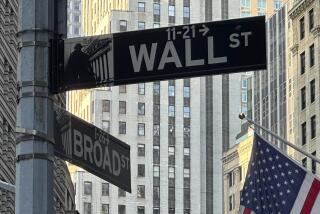Could Hussein’s Capture Provide a Market Boost?
- Share via
As markets opened today with powerful rallies in Japan and elsewhere in Asia, many Wall Street pros expected the capture of former Iraqi dictator Saddam Hussein to give U.S. stocks a boost -- at least for the short term.
In Tokyo’s early trading, the Nikkei 225 stock index was up 2.6%, and some investment strategists said Wall Street could follow today with a rally lifting the Dow industrials as much as 100 points and the technology-heavy Nasdaq composite index as much as 30 points.
In other markets early today, the dollar edged higher against the euro and the Japanese yen in Tokyo, and crude oil and gold prices plunged.
“It’s a nice, early Christmas present for the stock market,” Douglas Foreman, chief investment officer at Trust Company of the West in Los Angeles, said Sunday.
Coming on the heels of Wall Street’s rally Thursday and Friday, the surprise capture could add to the bullish momentum that lifted the Dow Jones industrial average past 10,000 last week for the first time in a year and a half and moved Nasdaq closer to the widely watched 2,000 level, analysts said. It also could help the sagging U.S. dollar.
“This was obviously good news, at least psychologically,” said Rich Weiss, chief investment officer of City National Bank in Beverly Hills. “My first reaction was we’re going to have a big opening on Wall Street. The stock market is going to love this.”
Although strategists expect a sharp rally, at least in early trading, they hinted that a record-setting move may not be in the offing.
“It would have been interesting if this had happened during a market day,” said Liz Ann Sonders, chief investment strategist at Charles Schwab Corp. in New York. “It’s a tougher call when it happens on a Sunday, more than 24 hours before the open, and people can digest all the news. It’s obviously a positive, but I don’t know if we’ll get a massive rally.”
Seasonal trends also are working in the market’s favor, as December historically has been one of Wall Street’s stronger months.
Any boost may be short-lived, however, experts warn.
“This may tip the scales and get more people helping us out in Iraq,” said Fritz Reynolds, manager of the Reynolds Fund in San Francisco. “On the other hand, it doesn’t mean you won’t still have rogues taking potshots at our soldiers.”
Indeed, investment strategists noted that it was unclear how much of a role Hussein was playing in the continuing attacks against U.S.-led forces patrolling Iraq.
“We don’t know to what extent he was calling the shots from his 6-foot box,” Weiss of City National said, referring to the underground hideaway where Hussein was found. “It’s not at all clear that the insurgency in Iraq is due to a centralized command.”
Regardless, the military campaign in Iraq is sure to produce some benefit, investment strategists said.
“Given the rewards and immunity offered, there will be a lot more singing by canaries,” Sonders of Schwab said. “This capture may bring forth a mini-chain of good news.”
In the longer run, strategists say, the sustainability of the stock market rally that began in March after three years of bear-market pain will depend more than anything on the durability of the U.S. economic recovery.
“Any plagues the market has been contending with lately have little to do with the geopolitical landscape,” Sonders said. “Wall Street is largely concerned about the falling dollar and the prospect of rising interest rates.”
Despite the weaker dollar, recent economic trends have generally been positive. Last week, the Federal Reserve said it remained committed to keeping interest rates low for a “considerable period,” although it also signaled that credit could be tightened in 2004 if signs of inflation flare. Some analysts fear that higher rates could put a damper on stock prices next year.
Meanwhile, corporate profits are continuing to grow amid evidence of increased capital spending by businesses, if only modest employment growth. In the fourth quarter, analysts expect U.S. blue-chip earnings to rise 21.5% overall from a year earlier, as measured by the Standard & Poor’s 500 index. For the first quarter of 2004, analysts are forecasting growth of about 12%.
The profit picture could come into clearer focus this week as more major companies offer fourth-quarter guidance.
As for other markets, the effect of Hussein’s capture is less clear. Some analysts said Treasury securities could be hurt if bullish investors shift assets out of fixed income and into stocks, but Weiss said the bond market was likely to benefit if “disruption” in Iraq subsides. Global investors also might show more confidence in the U.S. Treasury market, traders said.
Gold had its biggest intraday decline in a month in early trading today. Gold for February delivery fell as much as $8 to $402.10 an ounce in after-hours electronic trading on the Comex division of the New York Mercantile Exchange.
Crude oil fell on speculation that the capture of Hussein will reduce attacks on Iraq’s oil production facilities and speed the return of its exports to prewar levels. Crude oil for January delivery fell as much as $1.30, or 3.9%, to $31.74 a barrel in electronic after-hours trading on the New York Mercantile Exchange.
The dollar had its biggest gain in three weeks against the euro in Asia. Against the euro, the dollar traded at $1.219 in Tokyo, from $1.228 in late New York trading Friday. The U.S. currency traded at a record low of $1.231 per euro Friday and has fallen 14% this year.
*
Times wire services were used in compiling this report.
More to Read
Inside the business of entertainment
The Wide Shot brings you news, analysis and insights on everything from streaming wars to production — and what it all means for the future.
You may occasionally receive promotional content from the Los Angeles Times.










